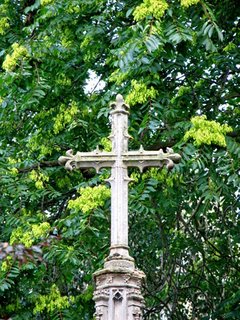
After the Baptism of the Lord, the Liturgical year enters the first week of a period known in the English translation as 'Ordinary Time'. Some people have criticized this rather banal and inelegant translation of the Latin
Tempus per annum. However, fr Timothy Radcliffe, OP has chosen in his latest book to reflect on this term and what it means for us. Typically, he makes the best of the situation and offers us food for thought; the fruit of his contemplation:
"We inhabit a story that gives us hope, the Christian year. This carries us from Advent, when we wait for Christ to come as a child, to the end of the year, when we wait for him to come at the end. So far we have focused on the dramatic core of that story, Christ's final days in Jerusalem, from Maundy Thursday to Easter Sunday. Much of the year is what we call 'ordinary time'. This sounds rather boring, as if we were just hanging around until the next exciting event in the liturgical year. It fills the gap between the fun of Christmas and Epiphany and the drama of Holy Week, and then between Pentecost and the end of the year.
This is wrong. Ordinary time celebrates what is fundamental to being human, which is that we are ordered, pointed beyong ourselves. It has its own contribution to make to showing the point of Christianity. We are ordered to each other. We cannot flourish alone. And we are ordered towards the Kingdom, in which we shall finally flourish together...
The Church should be a community is which one discovers the delight of being ordinary, of belonging to each others. God says to St Catherine of Siena, 'I could well have made human beings in such a way that they each had everything, but I preferred to give different gifts to different people, so that they would all need each other.' Bishops are called are 'ordinaries' not because the are boring but because they are charged with cultivating a community in which we may learn how to belong together. In the eighteenth century the word was also used for people who delivered messages, the early equivalent of postmen, who were vital to the interchanges of the community.The liturgical colour of 'ordinary time' is green, because it is the season in which we learn to flourish together...
The Church should be a community which summons one beyond the need to be a celebrity in order to matter and which frees one from the compulsion to claim the centre of the stage. We may learn the joy of ordinariness, not in the sense of being boring or undistinguished, but of being turned to face each other and receive life from each other... The Church should be a community in which the beauty of ordinariness is disclosed, because in our God, whose centre is everywhere and whose circumference is nowhere, then no one should feel on the edge."
(What is the Point of Being a Christian?, pp140ff)
 After the Baptism of the Lord, the Liturgical year enters the first week of a period known in the English translation as 'Ordinary Time'. Some people have criticized this rather banal and inelegant translation of the Latin Tempus per annum. However, fr Timothy Radcliffe, OP has chosen in his latest book to reflect on this term and what it means for us. Typically, he makes the best of the situation and offers us food for thought; the fruit of his contemplation:
After the Baptism of the Lord, the Liturgical year enters the first week of a period known in the English translation as 'Ordinary Time'. Some people have criticized this rather banal and inelegant translation of the Latin Tempus per annum. However, fr Timothy Radcliffe, OP has chosen in his latest book to reflect on this term and what it means for us. Typically, he makes the best of the situation and offers us food for thought; the fruit of his contemplation:






1 Comments:
I am the only Catholic blogger that I know who likes Ordinary Time above all the others (yes, I love Easter, etc.). But if I have to pick a favorite I always like the "delight of being ordinary" which is a lovely way to say it.
Thanks for this post ... I like the idea of us "flourishing together" in Ordinary time. :-)
Post a Comment
<< Home